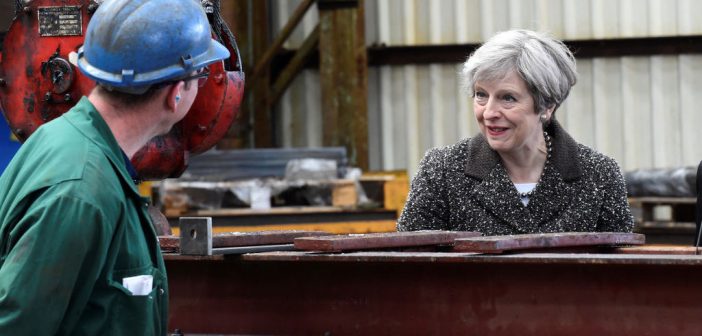Theresa May will this week promise a “new deal for workers” with a pledge to offer protections for “gig economy” workers and new rights to take time off to care for relatives.
Mrs May, who is trying to position herself as the politician on the side of working people, will commit to increasing the National Living Wage – currently £7.50 an hour – in line with average earnings until 2022.
The Conservative party did not say how much that would mean in real terms, although George Osborne, the former chancellor, said in 2015 he expected it to hit £9 by 2020. Labour has promised to increase the National Living Wage to £10 by 2020.
Mrs May also reiterated her commitment, outlined in the letter she sent to the EU formally triggering Brexit talks, to fully maintain all workers’ rights guaranteed by EU law after Britain quits the club.
The Conservatives said the manifesto promises – to be unveiled in full this week – would represent the “greatest expansion of workers’ rights by any Conservative government”.
Her package will also include a commitment to protect workers’ pensions in the wake of the BHS scandal; a new right to request leave for training purposes; a right to leave for workers who suffer the tragedy of losing a child; and the introduction of returnships for people coming back into work after a period of time off.
Mrs May will also change the Equalities Act to extend protections from discrimination to those suffering fluctuating or intermittent mental health conditions.
She will also outline new protections for those working in the “gig economy” – such as Uber drivers – following a review led by Matthew Taylor, a former advisor to Tony Blair.
But Mrs May’s attempt to pitch herself as the champion of “ordinary working people” comes as analysis suggests that low income working families face significant reductions in income as a result of planned cuts to benefits, according to the Institute of Fiscal Studies.
“In brief, since 2010 ‘middle income’ and pensioners protected, richest hit hard, poorer working age families about to be hit very hard,” tweeted Paul Johnson, director of the IFS, on Sunday.
The think-tank says a cash freeze in benefit rates, cuts to child tax credits and roll-out of the “less generous” universal credit signals “large losses” for low-income families.
The analysis found one million households with children and no one in work would be £3,000 worse off, while three million working households with children currently entitled to tax credits would be on average £2,500 worse off. A further four million households with children not entitled to tax credits would be £100 a year worse off.
Andrew Gwynne, Labour’s campaigns and elections chair, said the Prime Minister was “taking working people for fools”.
“Theresa May and her Tory government have failed to stand up for workers, with hundreds of thousands not being paid the money owed to them, thousands unable to get their case against their employer heard and hundreds of complaints of employment agency malpractice going uninvestigated.
“The Tories have spent the last seven years prioritising the few, opposing Labour’s proposals to give workers more rights and overseeing wage stagnation which has left people worse off.”
Vince Cable, the Liberal Democrat shadow chancellor, was equally scathing.
“The Conservatives tried to ban workers from striking and were blocked by the Liberal Democrats in government,” said the former business secretary, who clashed with No.10 over workers’ rights in the coalition years.
“It’s clear they aren’t the party of workers’ rights and that you can’t trust them to care about you and your family.”

